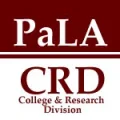The ethics of digital piracy
As librarians, we often encounter patrons engaging in behaviors that can be frustrating or disruptive, from ignoring due dates to vaping in study rooms. Is digital piracy a problem you’ve considered? Are you aware of the extent to which students and faculty on your campus rely on pirate sites (also known as shadow libraries) to download copies of textbooks and others resources that your library may not provide?
I began to pay attention to the digital piracy problem after the U.S. Justice Department seized and shut down the website of the popular shadow library, Z-Library, in November 2022. Soon after that, I was helping a student request a book through interlibrary loan. The student expressed their disappointment at the loss of the pirate site, which they had relied on to access books for their classes. This event made me question the extent to which students resort to ebook piracy as both a cost-saving measure and a tool of convenience. Despite our efforts to reduce textbook expenses for students through our textbook reserve program and the promotion of open educational resources, it is clear that students are using other methods to get assigned materials.
The ethical dilemma posed by digital piracy is real. While we want to ensure access to information for our students, especially those with limited funds, authors do have a right to control how their work is distributed and to make a living from their writing. Curious about this crucial issue, Haley Dittbrenner (a Susquehanna University sophomore) and I applied for and then received Susquehanna’s March Fellowship for Ethical Leadership. To better understand the prevalence and impact of digital piracy in academic libraries, we will survey faculty and students about their own experiences with shadow libraries. We hope to spark a dialogue about the ethical implications of digital piracy at Susquehanna University, raise awareness among those who use pirated materials of the risks and consequences, and identify measures students and faculty can take to reduce digital piracy.
We are currently reviewing the literature and designing the survey, but we plan to share our results with Pennsylvania Library Association members at the annual conference or through another medium. Are you also curious about ebook piracy on your campus? Interested in collaborating? Get in touch with us here!
Note: This post includes text originally written for our March Fellowship application. The final text was edited with the help of the artificial intelligence chatbot, ChatGPT.
